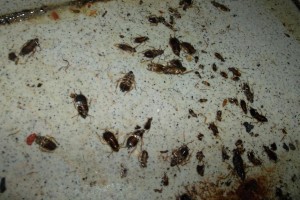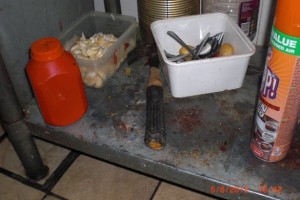Alisha Johnson, a food safety educator and inspector with Montana’s Missoula City-County Health Department Environmental Health Division writes in this column that as a health inspector, I don’t get invited to many potlucks or dinner parties.
 However, when I do, inevitably the host asks me to rate the cleanliness of their kitchen. They wait for my answer, nervously clutching a bowl of salsa like a life preserver, their eyes a turbulent mix of terror and hope. After I reassure them that their kitchen looks lovely, they smile and in their moment of relief, eat out of the bowl of salsa with their hands, politely licking their fingers before offering it to others. If that wasn’t awkward enough, people’s reactions to what I do for a living can take things to a whole new level. Typically, it’s a healthy mix of questions, storytime, and discussion.
However, when I do, inevitably the host asks me to rate the cleanliness of their kitchen. They wait for my answer, nervously clutching a bowl of salsa like a life preserver, their eyes a turbulent mix of terror and hope. After I reassure them that their kitchen looks lovely, they smile and in their moment of relief, eat out of the bowl of salsa with their hands, politely licking their fingers before offering it to others. If that wasn’t awkward enough, people’s reactions to what I do for a living can take things to a whole new level. Typically, it’s a healthy mix of questions, storytime, and discussion.
Depending on the crowd, I may get “How does it feel to be most hated person in town?” or “Tell me about the grossest thing you’ve ever seen,” which determines whether I will feel like a celebrity or the village pariah for the rest of the evening. And — don’t even get me started on how I’m the Grinch that ruins Christmas dinner. During these interactions, fun or awkward, nothing amazes me more than the misconceptions out there about what we do in public health and about food safety in our personal lives.
Misconception No. 1: Health inspectors must be the most hated people in town.
Sorry to burst the hyperbolic bubble, but negative relationships between inspectors and establishments are few and far between. While not everyone may like what we tell them, the majority of operators are great people who understand that we’re there to help them. I remember an inspection the first year that I worked at health department that had pages of violations. Instead of calling my supervisor to complain about me, the operator called to say what a great learning experience their inspection had been. And this isn’t a unique case. So yeah, it’s a tough job, and sometimes things get tense, but overall, our inspectors have a relationship with operators built on mutual respect.
Misconception No. 2: The health department is the reason so much food gets thrown away.
Actually, very rarely does the health department require someone to toss food and it only happens when it is danger to public health. You may remember when the health department directed a vendor to discard food at the 2014 fair. This rare event happened because food hadn’t been refrigerated for days. However, stores tossing food because of “best by” dates or quick service restaurants tossing food every hour are doing that based on their own quality guidelines, not health codes. For example, “sell by” and “best by” dates on products that you buy at the grocery store are for quality, not safety. With the exception of baby formula and some refrigerated products, there are no regulations for discard. On the other hand, some “use by” dates are for safety such as those on many vacuum sealed, refrigerated products.
 Misconception No. 3: See no evil, smell no evil—it’s gotta be safe.
Misconception No. 3: See no evil, smell no evil—it’s gotta be safe.
People seem to think that if food smells fine and looks fine, it’s safe to eat. My dad used to do the “sniff test” with the milk to see if it was still good and I’ve even seen restaurant operators take a whiff of something to see if it’s servable. However, the “sniff test” tells you nothing. One of the most dangerous pathogens out there, Listeria monocytogenes, doesn’t change the way that a food looks or smells, and it grows well on cold, ready-to-eat foods—even when they are kept refrigerated. Things like deli meats, soft cheeses, and leftovers can be a risk for this pathogen if kept too long in the fridge. This particular pathogen is nothing to shrug off. It can be deadly for those with weakened immune systems like kids and people getting on in years, so it’s definitely one to take seriously. A good way to protect against listeriosis is to use leftovers and ready-to-eat products like cold cuts within four days—even if there’s no slime and they smell fine.
Misconception No. 4: If the bathrooms and floors are clean, the kitchen is clean too.
While that may be true in many cases, it’s not a guarantee. I’ve been a part of foodborne illness investigations where the place looks fantastic in the customer areas, but it’s falling apart in the kitchen. And I’ve also seen amazing operations from a food safety angle, but the customer areas were a little worse for the wear. Food safety is more than cleanliness, though cleanliness has a lot to do with it. A good clean facility is a foundation on which other parts of a good operation are built; however, a clean facility doesn’t mean that food is being kept hot or cold, getting cooked as needed, or that employees are washing their hands when they are supposed to. The best way to know if your favorite restaurant is doing a good job isn’t to look at the bathroom; it’s to be an educated consumer. Look at our inspection reports. They are all public record and available online. They are part of the public service that we provide to you—our community.
Misconception No. 5: I feel miserable. It’s gotta be the restaurant where I ate lunch.
Very rarely is it the last thing that you ate that made you sick, and it’s not always a restaurant’s fault. Some illnesses may take days or even weeks for symptoms to show. Salmonellosis may take three days before its classic symptoms rear their ugly heads. Hepatitis A could take up to six weeks. This means that what made you sick could be a number of things in that window of time — including something that you made at home or ate at a potluck (to which I was not invited). We do unsafe things in our own homes that we don’t even realize put us at risk. For example:
Do you take temperatures of chicken, burgers, and other animal products to make sure that they are cooked, or do you rely on color and texture? Color and texture are not reliable ways to tell if something is cooked. Frozen versus fresh meats, fat content, cooking method, and a variety of other things can influence color and texture. Cooking foods to the minimum internal temperature recommended by the USDA is the only sure bet.
Do you let cooked food sit out on the counter for hours? What about leftovers? Do you tightly seal them in a container and put them in your fridge? Letting food sit at room temperature for too long or not properly cooling leftovers is responsible for a large portion of the foodborne illnesses we see each year in the U.S. Keep foods hot or cold, limit the time food sits out to two hours or less, and help leftover foods cool quickly by refrigerating them in shallow containers with the lid vented until completely cool.
Do you wash your hands every time you make food? Between raw meats and ready-to eat items like vegetables? How about before eating? Do you use soap and hot water, or do you just rinse your hands and wipe them on a towel? Think about all of the things that your hands touch over the course of the day and when preparing a meal. Hand washing is one of the most effective health promotion tools. Scrubbing your hands using hot water and soap and cleaning under your fingernails can remove dirt, debris and pathogens that can make you sick. Washing hands at the right times is an easy way to protect your health.
 The campaign mainly targets Mandi places and traditional restaurants as they get more customers during Ramadan.
The campaign mainly targets Mandi places and traditional restaurants as they get more customers during Ramadan.










